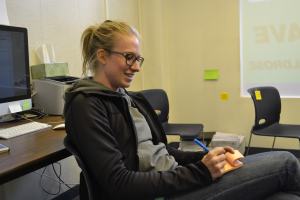It is never more important for us to be brave and present than in times of change.
This provincial election campaign has certainly shown that Albertans’ political appetites are changing. But that is just the manifestation of larger changes taking place around us. Our province’s population is growing incredibly fast. It is young, it is more urban than ever before, and it is nurturing a generation of young citizens – especially Indigenous ones – who aren’t willing to put up with business as usual. Citizens who are growing restless with being told that we must accept leaving 1 in 6 children in poverty while wealthy corporations plead, “Why is it always us?”
The Progressive Conservatives are saying – as they have said for my entire lifetime – that the time for change is not now. That our economy is too fragile. First of all, they share a good deal of responsibility for crafting it into a frail crystal house ready to shatter when oil and gas prices fall out from underneath it. But also. Also. There is no better time for change. There is, perhaps, no other time at all for transformational change.
One of the profound and simple ideas in Naomi Klein’s book The Shock Doctrine is that in times of crisis, the ideas that will be used to solve that crisis are the ones closest at hand. For a generation, neoliberalism has risen to that challenge. Time and time again, economists prescribing savage cuts to public health care and education and indulgence to corporate power have put themselves at the centre of power after war, economic shocks, and social shocks. The collapse of oil prices right now is one of those shocks. And for once, the levers of democracy might give us all the chance to be the ones ready with new ideas for this province.
We have a chance to use this moment to remake our society into something stronger, and more resilient. A society that can look at the floodwaters of the Bow River and the generational challenge of climate change, the weakness of pinning all our prosperity to fossil fuels, and say, “Let’s build something that will really last. An economy and a society that acts like it’s here to stay, not here to pillage.”
When I think of Jim Prentice’s pleading that the PCs are the only party that can be trusted with responsible stewardship of this province, I think of Naresh Bhardwaj. Long before he was booted as a PC candidate over allegations of bribing a challenger to drop out, I knew him as an MLA who delivered one of those oversized cheques to the NGO I worked for. A few months later, an NDP MLA invited us to the Legislature so we could be recognized as guests up in the gallery. Bhardwaj ran into us in the lobby, and seemed offended when he found out we had come as guests of a member of an opposition party. He told us that wasn’t any way to make friends in the Legislature. He clearly thought that handing us a novelty cheque from the government meant he had bought our loyalty to his party. [Edit: To be fair, it just seemed like that was the implication]
And I think of a story we worked on at Terra Informa two years ago, about the Alberta Energy Regulator’s response to the bitumen leaks at CNRL’s oil sands site near Cold Lake. The Alberta Energy Regulator, this monstrous hybrid created by the PCs to both regulate the energy industry and approve its proposals for new projects. And how we asked them to explain why people living right beside one of the leakage sites hadn’t heard about it until two months after the it was discovered. And how they told us that they’d posted the information on their website, and if residents didn’t see it, it was their own fault.
I think of the representative I spoke to at Servus the other day, when I called to get an explanation for the $3750 they donated to the PC party this year. And how he said he felt uncomfortable about it, but paying to go to PC fundraiser dinners was the only way to get access to government ministers. And how I asked him whether it struck him as a corrupt situation, having to feed their party warchest before an election to get access to government officials. And how he genuinely pleaded with me to ask what the alternative was.
Massive changes are needed to the way we govern ourselves, to the way we treat the atmosphere, to the way we balance private power with collective prosperity. We’re going to need to move quickly now. The hour is already late. This is not a plea to vote NDP or Wildrose. You can make up your own mind about where to spend your vote. And addressing our generation’s challenges will take more than putting one new provincial government into office. But I am asking you to take Jim Prentice’s advice and look in the mirror. Who is going to shake the earth with a new vision? Who is going to have their ideas closest at hand right now?
As Hopi elder Thomas Banyacya once said, We are the ones we’ve been waiting for.




